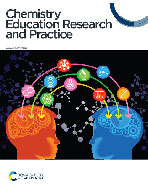Student participation in a coastal water quality citizen science project and its contribution to the conceptual and procedural learning of chemistry
Abstract
The active participation of citizens in scientific research, through citizen science, has been proven successful. However, knowledge on the potential of citizen science within formal chemistry learning, at the conceptual and procedural levels, remains insufficiently explored. We developed a citizen science project – PVC: Perceiving the Value of Chemistry behind water and microplastics – which sought to involve students in monitoring the physicochemical parameters of coastal water quality, through the detection of microplastics in these waters, in addition to the qualitative identification of plastic contaminants on beaches. The project was conducted throughout the 2018/2019 school year and involved 442 middle school students (Key Stage 3 (KS3) aged 12–14, in Portuguese schools) and 9 chemistry teachers, in the northern coastal region of Portugal. The data on learning outcomes was collected through knowledge tests, applied after project conclusion, and was then compared to data collected up to six months later (retention test). In addition, interviews were conducted with participants, and researchers’ field notes were recorded and analyzed. Data analysis suggests the PVC project promoted conceptual chemistry learning related to the analysis of physicochemical water parameters (pH, temperature, turbidity, salinity, nitrate and nitrite concentrations and dissolved oxygen), as well as polymers (polymer types, formation and structure). A positive knowledge retention was registered a few months after the project conclusion. At a process level, participants learned laboratory techniques (sieving, gravity and reduced pressure filtrations and crystallization) and the handling of laboratory materials. Furthermore, teachers recognized that their students’ participation in the PVC project fostered the development of their argumentation skills, as well as their reflexive and critical thinking skills. The ability to communicate ideas and results, along with the development of students’ digital skills, was also mentioned.


 Please wait while we load your content...
Please wait while we load your content...